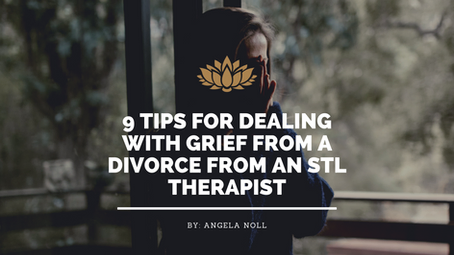By: Angela Noll
It can be bittersweet. You have freedom now, yet you are mourning the loss of a dream. A dream you believed you both shared.
Divorce…
When you decide you can’t live like this anymore and you feel abandoned in a union that had promise.

But that’s just it, isn’t it? Promises sometimes get broken. Relationships fall apart. And in the midst of all of the tasks of getting divorced, you’re also left with emotional weight of this unfamiliar journey. It’s unique unto itself.
Questions arise, interactions catch you off-guard. Things like:
How do you grieve the loss of someone who is still alive?
The wound that opens when you see your ex-spouse while exchanging the kids.
A song you haven’t heard in ages comes on the radio and reminds you of “that one time” you had with your former partner.
And what can be weird about grief after a divorce is how it FEELS like “real” grief (spoiler alert: it is), but people don’t necessarily act the way they would if it was grief from a death.
There’s different pressure to “keep it together”….especially if their are children from the relationship.
Friends aren’t lining up at the door with casseroles.
Few people remember the “anniversary” of the divorce, or other major dates like your ex-spouses’ birthday or your wedding anniversary.
But the fall-out of grief after divorce is so, so real. That fall out happens in your head. It happens in your heart. It happens in your body and in your soul. No part of you gets left unscathed from divorce….amicable or otherwise.
Depression may set in.
Your self-confidence is low.
Questions circle through your mind concerning your future:
Will I ever find love again?
Do I want to find love again?
Am I capable of making good decisions concerning dating?
So much uncertainty and doubt fills your head. So how do you grieve this loss without losing yourself? The reality is you must walk through the grief to get to the other side.

Here are 9 tips to help you cope with grief after a divorce, from one of our St. Louis therapists.
1. Take care of you.
Schedule a massage, take a walk through a park, join a gym, find a yoga workout on YouTube, take a bubble bath, and light some candles. In other words, do what makes you feel happy, or what makes you feel cared for. This is a time to pour into you. It might not make you feel that much better, but it may help you keep the bottom from falling out. Small acts like this will eventually build….but you have to commit, at least somewhat frequently, to actually doing them.
2. Find a therapist to talk with.
Just being able to sort out your feelings with a professional therapist can make a big difference. A good therapist will listen and not judge you. You can take your time looking at the relationship from all sides; you can get an objective perspective, which your friends and family can’t always offer. And the time can be all for you.
3. Let your friends know you need their support.
Your friends want to be there for you, and it’s okay to send a text that you’re having a hard day; or just need a distraction; or just need a minute to vent. You’re not burdening your friends when you call on them for help—that’s participating in the relationship, and exactly what friends are for.
4. Feel your feelings.
Allow yourself to get in touch with your emotions. A good cry is not a sign of weakness. Your heart has been broken and you can give yourself permission to grieve a very significant loss. You don’t have to talk yourself out of any of those feelings–they are all valid, understandable. Go ahead and let them have their day. They’ll move along once they had their time with you. But it is important to feel them, so they don’t get the best of you at an inopportune time.
5. Journal your emotions.
You can write down what your loss feels like. Writing down your emotions has the ability to release the pain…it’s a cathartic exercise. Writing down what mood you’re in can help you identify the triggers in your life. Journaling can decrease anxiety and depression. Find an attractive journal with a good pen and keep it in a safe place. Review in a month and see if you have progressed. If you haven’t, that’s okay! That can give you some insight that the wound still is healing and to maybe change some of the day-to-day aspects of life to help with that. Or, maybe you’ll surprise yourself with some of the progress that you didn’t necessarily feel without a more black-and-white tracker. Whatever the result, journaling can often help move the needle.

6. Keep a food journal for a week.
Why? Well, the awareness of what you eat in a time of transition may help you notice some patterns or be able to gain some influence about choices that can help you feel better. Comfort food may have a time and place, but nutrition-dense food does, as well. What we eat contributes to our body’s ability to make hormones, amongst other emotional processes. At a time where so much may feel beyond your control, considering ways to fuel yourself may be a place to–in a healthy way–feel like you do have some power over your life.
7. Find a mantra that sets your mind towards positivity
….or at least gives it a break once in awhile from negativity, ruminating, self-blame, or any of the other icky thoughts that can spring up and grip you in the aftermath of divorce. For instance; “Every exit is an entry to somewhere else.” “If you think you can, you can.” “I am enough.” “I deserve my dream.” The Israeli psychologist, Daniel Kahneman says, “It’s a wonderful thing to be optimistic. It keeps you healthy and resilient.” And if some of those mantras feel like tooooo much of a reach at a certain point in time, just reduce them to something more believable–whatever that is for you at the time.
8. Develop coping strategies.
Take deep breaths when you feel upset. Find your happy or calming place by using visual imagery to relax your mind–whether it’s imagining a sunset at the beach or a cabin in snow-capped mountains. The point is: utilizing hobbies (things that give you pleasure and allow you to escape for a bit) and specific coping strategies that give you capability to handle tough emotions….that’s the place to put energy. You’ll need them both. And get them ready. Make a list of what to use when certain triggers come up. It’ll help you feel more prepared, more capable, and less overwhelmed when you do hit a rough patch.
9. Set realistic goals.
If we’re being real, many of us often swing to a reaction of “I am going to change my entire life” at some point in the aftermath of a divorce. And if not your whole life, then there is usually a desire to significantly change—-or at least consider changing—at least one aspect of it. First things first: let yourself have your moment. Go ahead and dream up that new life. Let it percolate in your head a bit. And then, when you’re ready to get serious and commit to the change you do want to make, use some realistic goal-setting techniques for those changes. If you want a new career, do the research and set a timeline. If you want to move to a new city, go spend a few days there alone and experience what it would feel like to go for a walk in the middle of the day during the week; to go to dinner on a Tuesday night by yourself; etc. Whatever the goal, write it down and outline what it would take to get there. Talk to a trusted person about it and explore aspects of the plan you maybe missed. And then, believe you deserve it!

This all takes practice and perseverance, but with time you can make it through the grief and loss. If you’re looking for therapy to help you through whatever stage of that grief you’re in, reach out to us today. Our therapists are ready to partner with you to accomplish these steps, and more.
Start Therapy for Mental Health in St. Louis
If you live in St. Louis and are ready to improve your mental health, we are here to help.
Contact Us!
Additional Counseling Services at Marble Wellness in St. Louis, MO and Chicago, IL
Counseling services designed to help set you on a path of living a more fulfilled, calm, and happy life.
St. Louis
Our St. Louis team of therapists have a variety of training backgrounds and areas of expertise. We specialize in anxiety, depression, grief, chronic illness, therapy for men, couples, and maternal overwhelm. We can also help new moms with various postpartum concerns, moms in the thick of parenting, and moms with teens. We can also chat from wherever you are in the state with online therapy in Missouri and online therapy in Illinois. No matter where you are in your journey, we would love to support you.
Chicago
Our Chicago team of therapists offer a wide range of mental health services to help our clients through the different challenges and hurdles in their life. In addition to anxiety, depression, grief, therapy for men, and maternal overwhelm, we are specialized in professional burnout, therapy for breakups, and love partnering with working moms.




